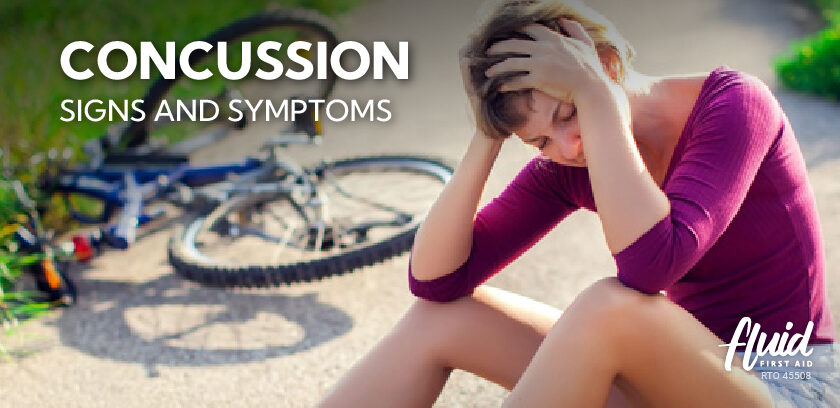The Fluid Learning News+
Concussion Signs & Symptoms
- April 4, 2025
- Posted by: Chris Clarke
- Category: First aid First Aid Myth Busters News

Head injuries are common, whether from a fall, a sports accident, or a car crash. One of the most frequent outcomes of a head injury is a concussion—a type of mild traumatic brain injury (TBI). While concussions are generally not life-threatening, they can have serious effects if left untreated. Understanding what is concussion, recognising its symptoms, and knowing how to treat concussion properly can make a big difference in recovery.
What is Concussion?
A concussion occurs when a sudden impact or jolt causes the brain to move rapidly within the skull. This movement can cause temporary changes in brain function, leading to various symptoms. While most concussions are mild, repeated or severe concussions can have long-term effects.
Many people recover within a few weeks with proper rest and care, but knowing the right steps to take can prevent complications and ensure a smooth recovery.
What are the Common Causes of Concussion?
Concussions can happen in various everyday situations. Some of the common causes of concussion include:
-
Falls – A slip on a wet floor, tripping over an object, or falling from a height.
-
Sports injuries – Contact sports like AFL, rugby, soccer, and basketball pose a high risk.
-
Car accidents – Sudden stops, crashes, or even whiplash can cause concussions.
-
Workplace incidents – Falls, head bumps, or impacts with heavy objects.
-
Physical altercations – A direct blow to the head during a fight or accident.
Understanding these common causes can help with prevention, such as wearing helmets when cycling or ensuring workplaces and homes are free from tripping hazards.
What are Signs and Symptoms of Concussion?
If you’re wondering how can I tell if someone has concussion, look out for these key signs and symptoms of concussion. Symptoms can appear immediately or develop hours after the injury.
Physical Symptoms:
-
Headache or pressure in the head
-
Dizziness or loss of balance
-
Nausea or vomiting
-
Sensitivity to light or noise
-
Blurred or double vision
Cognitive Symptoms:
-
Confusion or difficulty concentrating
-
Memory problems (forgetting recent events)
-
Feeling dazed or sluggish
-
Delayed responses to questions
Emotional Symptoms:
-
Irritability or mood swings
-
Anxiety or nervousness
-
Feeling sad or down
Sleep-Related Symptoms:
-
Sleeping more or less than usual
-
Difficulty falling asleep
-
Feeling excessively tired
If a person experiences multiple symptoms, even if they seem minor, it’s important to monitor them closely.
How Do I Treat Concussion?
Providing first aid for concussion is crucial to ensure a safe recovery. Here’s what to do if you suspect a concussion:
-
Encourage Rest – Limit physical and mental activities. Avoid screens, bright lights, and strenuous work.
-
Apply a Cold Pack – Place an ice pack (wrapped in a cloth) on the head to reduce swelling.
-
Monitor Symptoms – Watch for worsening symptoms over 24-48 hours.
-
Avoid Painkillers Immediately – Do not give aspirin or ibuprofen, as they can increase the risk of bleeding.
-
Do Not Leave Them Alone – Keep the person under observation, especially within the first few hours.
-
No Alcohol or Drugs – Avoid substances that may affect brain function.
-
Gradual Return to Activities – Only resume normal activities when symptoms fully subside and after a doctor’s approval.
When to Seek Medical Help
While many concussions heal with rest, some require immediate medical attention. Seek urgent help if the injured person:
-
Has a worsening or severe headache
-
Vomits repeatedly
-
Experiences seizures or convulsions
-
Has slurred speech or difficulty understanding others
-
Shows weakness, numbness, or poor coordination
-
Struggles to stay awake or loses consciousness
-
Displays unusual behaviour, mood swings, or agitation
A doctor will assess how to treat concussion based on symptoms and may recommend cognitive tests, balance assessments, or imaging (CT or MRI scans) to rule out serious brain injuries.
Conclusion
Recognising the signs and symptoms of concussion early is key to ensuring a safe recovery. If you or someone else experiences a bump to the head, take immediate first aid measures and monitor for worsening symptoms. Understanding what is concussion, its common causes of concussion, and how to treat concussion correctly can help prevent long-term complications. If in doubt, always seek medical advice.
Check out First Aid Australia’s courses here – Fluid First Aid – Courses
And for premium First Aid Kits and the best prices visit First Aid Kits Australia
Leave a Reply Cancel reply
You must be logged in to post a comment.
